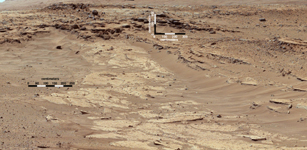 |  |
| Figure A | Figure B |
Click on an individual image for full resolution figures imageSandstone layers with varying resistance to erosion are evident in this Martian scene recorded by the Mast Camera (Mastcam) on NASA's Curiosity Mars rover. The component images were taken by the Mastcam's left-eye camera shortly before midday of the 553rd Martian day, or sol, of the rover's work on Mars (Feb. 25, 2014). The location is about one-quarter mile (about 400 meters) north-northwest of a planned waypoint called "the Kimberley," by straight-line distance, longer by driving distance.
Differing degrees of resistance to erosion result in a stair-stepped pattern visible here. Steeper steps result from more resistant rock, so the flat, tan surface is a weakly resistant sandstone. The small steps to the right center are a bit more resistant, and the steeper steps near the top of the scene are even more resistant.
The image has been white-balanced to show what the rocks would look like if they were on Earth. A version with superimposed scale bars is available as Figure A; the bars at different locations and orientations in the scene are labeled for lengths of 200 to 300 centimeters (79 to 118 inches). A version with raw color, as recorded by the camera under Martian lighting conditions, is available as Figure B.
NASA's Jet Propulsion Laboratory, a division of the California Institute of Technology, Pasadena, manages the Mars Science Laboratory Project for NASA's Science Mission Directorate, Washington. JPL designed and built the project's Curiosity rover. Malin Space Science Systems, San Diego, built and operates the rover's Mastcam.
More information about Curiosity is online at http://www.nasa.gov/msl and http://mars.jpl.nasa.gov/msl/.

